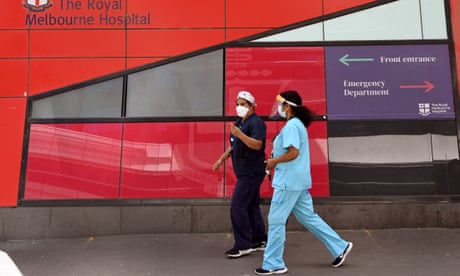- by foxnews
- 23 May 2025
International doctors unable to work in Australia due to ‘broken system’, experts say
International doctors unable to work in Australia due to ‘broken system’, experts say
- by theguardian
- 24 Jul 2022
- in news

Hundreds of foreign-trained doctors living in Australia have been unable to work due to what critics say is a "broken system", amid calls for the process to be improved to help address chronic workforce shortages in the health sector.
The health minister, Mark Butler, had flagged his concerns about the registration for international medical graduates (IMGs), saying he has sought advice about how to speed up registration for doctors already in the country.
The Australian Medical Association (AMA) president, Omar Khorshid, said the process for IMG registration in Australia was complex, and different issues applied depending on whether a doctor was a specialist or a junior doctor.
He said the process for specialist approval in Australia was "rigorous, expensive, and it takes a long time".
"There is no doubt there are people who are in that system who are struggling," Khorshid said.
He said in many instances, doctors who had been working with limited registration but were unable to meet various regulatory requirements would be forced to cease practise, or in some cases leave the country.
Khorshid said he believed the bar should remain high for specialists seeking accreditation in Australia, but that there needed to be an improvement to the process and more support given to IMGs to join the workforce.
"No one has put enough attention on this, and despite it being raised with the health department and the minister by us over the last year or so and we haven't seen any change," he said. "And now that we're in this desperate situation, it just seems so silly.
"And if they have heard of people that have jumped all of those hoops and still can't work after years, it is going to stop people coming here. So this actually should be a priority to address the situation for these doctors so that it's not seen as a barrier for others to come to Australia if they want to come and join our medical workforce."
Spanish-trained doctor Paula Garcia told Guardian Australia she had been frustrated by the registration process in Australia, after she was unable to gain registration despite having a job offer at the Prince Alfred hospital in her specialist field of fetal ultrasound. The qualified obstetrician had previous relevant experience in Australia, and a letter of support from the hospital saying they had been otherwise unable to fill the role.
"It feels broken, it feels discriminatory," she said.
The Royal Australian College of General Practitioners president, Karen Price, said the issue was particularly concerning for those in regional areas which faced acute shortages, adding that even for countries like the UK the process was lengthy.
"For some other countries which have to go through a different process they take even longer and it costs a lot of money, so it's really a bit of a barrier and right now, we need to be looking at streamlining red tape not making more," she said.
The Australian Health Practitioner Regulation Authority (Ahpra), which is responsible for registration and accreditation in Australia, said it is managing 1,594 open applications for registration from IMGs.
This includes 663 applicants who have "in principle" registration and must complete the final step of providing proof of identity in person, in Australia.
"Public safety is our priority," an Ahpra spokesperson said. "We are part of a system of national accreditation and regulation that ensures Australia's more than 825,000 registered health practitioners, including international medical graduates are suitably trained, qualified and safe to practise.
"The registration process is an assessment of a practitioner's skills and qualifications to ensure that they can practise safely and professionally. It's not a tick-box exercise."
Ahpra said that about 75% of applications received are initially incomplete, usually because of missing information including identity documents, correct certification and translation documents, employment information and certificates of good standing from other regulatory authorities.
A spokesperson for the Department of Health said it was looking at the issue.
"In response to concerns raised by the AMA on this issue, the department has been in discussions with the AMA, the board and the AMC (Australian Medical Council) to examine the barriers experienced by this group of IMGs and to identify opportunities for improve the system while maintaining quality and safety measures within registration requirements," they said.
"The department is continuing to work closely with stakeholders, including state and territory governments, to ensure eligible IMGs have an efficient pathway to registration and employment."
- by foxnews
- descember 09, 2016
United Airlines flight returns to Hawaii after concerning message found on bathroom mirror; FBI investigating
United Airlines Flight 1169 to Los Angeles returned to Hawaii after a "potential security concern" aboard the plane. The FBI and police are investigating.
read more


